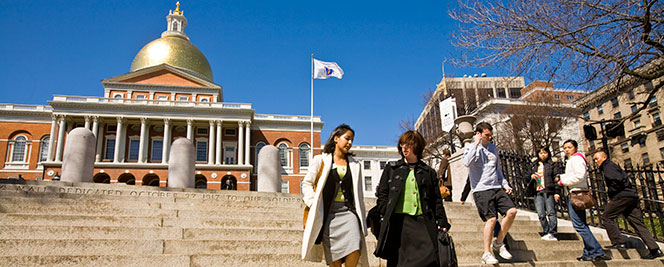Boston students on the hunt for public policy master's degree programs will find there's no lack of options in their area. To provide an idea of what to expect from such programs, this article focuses on the coursework required at three universities located less than 15 minutes from the central part of the city. It also includes a table of facts and figures on the profiled schools in addition to info on several other college options in the area. • Located about five miles from the center of the city, the University of Massachusetts - Boston (UMass - Boston) offers in-state tuition for graduate degree seekers through an accelerated program designed for working professionals. Students can earn a master's degree in public administration at the institution.
• The prestigious Harvard University features a master's in public policy with six areas of concentration. The campus is roughly four miles from central Boston. • Students can select one of four areas of focus in the law and public policy master's program at Northeastern University, located in the heart of Boston just three miles from downtown. Financial considerations are usually of importance to many college students - perhaps just as important as schools' academic program offerings. Two of the three featured institutions have noticeably higher tuition rates, which is not uncommon among private universities. Get specifics on the costs, as well as additional facts, in the table below. University of Massachusetts - Boston Harvard University Northeastern University School Type 4-year public university 4-year private, not-for-profit university 4-year private, not-for-profit university Graduate Enrollment (Fall 2014) 4,056* 18,453* 6,288* Campus Setting Large City Midsize City Large City Graduate Tuition (2015-2016) $2,590 in-state; $9,758 out-of-state* $41,832* $21,801* Source: *NCES College Navigator University of Massachusetts - Boston Upon opening in 1965, the University of Massachusetts - Boston became the second school in the UMass system.

The McCormack Graduate School of Policy and Global Studies houses the Department of Public Policy and Public Affairs with certificates and degree programs at the master's and doctoral level. Ego Game Engine on this page. Master of Public Administration The Master of Public Administration (MPA) degree program at UMass - Boston is an 18-month program designed for working professionals. Program coursework focuses on regional issues of policy development and governance, covering topics such as New England politics, public management, policy analysis and public budgeting. Other program courses include financial management and organizational behavior, as well as research methods and design. Students will also complete a public affairs case study capstone seminar. Harvard University Harvard University's John F.
Kennedy School of Government offers graduate degree programs in a variety of areas of public policy and public administration. The Harvard Kennedy School also has opportunities for course assistants and teaching fellows. Master in Public Policy Prerequisites for entrance into the Master in Public Policy (MPP) program include undergraduate coursework in economics, statistics and calculus.
The most relevant trends and data to help you find the best accredited public health programs in Boston, Massachusetts. Information on students, faculty and public. The Master of Public Policy is the 'industry standard' among public policy degrees. Learn more about the curriculum, research, and how to apply.
Preferred prerequisite experience includes 2-3 years of related professional experience. Students pursuing the MPP will select one of six required areas of concentration, which include business and government policy, democracy, politics and institutions, international and global affairs, international trade and finance and political and economic development, as well as social and urban policy. The program will include a spring exercise involving specialized topics, such as social security reform and global warming.